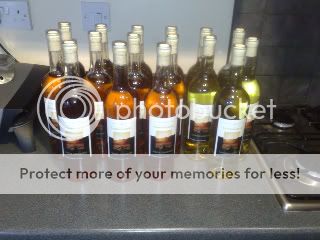Wez said:
IIRC BrewStew is more knowledgable on wine than me, I'm sure he'll be able to advise better.
If you can call doing one wine kit knowledgable :lol:
My Beaverdale Merlot wine has only been in the bottle two weeks. had a glass of it last night, and although it tastes pretty good, i'm going to leave it another month before i sample another bottle.
it's the dark red 'proper' stuff ie not fizzy pop lambrini **** :lol: so can't really advise.
I wouldn't put it in a cornie.
Wine is definitely not a "quick fix" though. it's better left for a period in bottles, on their side to allow them to breathe through the corks and so the corks don't go dry.
temperature is also crucial for ageing a wine, here's an extract from
this site
This is certainly the greatest concern when cellaring wine. Today's modern, centrally heated homes are not at all conducive to wine storage. Room temperature is usually in excess of a very comfortable 20ºC, great for humans but rapidly lethal when it comes to wine. The temperature inside the average home is also very variable, with most rooms warming rapidly during the day as the radiators switch on, cooling again at night as the heating is switched off. This is also true in the kitchen, where many people seem to store wine, at least in the short term. Here the ambient temperature varies significantly, reaching obscene levels when the Sunday roast is in the oven and there are pans bubbling away on the hob. This inconstancy of temperature is of as much concern as the temperature itself.
The ideal temperature is 10ºC to 13ºC, but several degrees either side of this is quite safe. In fact, provided the wines do not freeze, which does not occur until the temperature drops some way below 0ºC (the alcohol acts as an antifreeze), then it is quite safe for temperatures to drop lower than the ideal. The worst that may happen is that some non cold-stabilised wines may throw a small deposit of harmless tartrate crystals, which is of no real consequence. It is worth remembering, however, that one of the purposes of cellaring wine is so that it develops over time, gracefully maturing into something more complex and interesting than the wine in its youth. Lower temperatures inhibit this process, meaning you will have to wait even longer to enjoy the wines at their peak. A little above 13ºC is also quite safe, and I would be happy with wines stored medium term in temperatures up to about 15ºC. This will not spoil the wines at all, but as you may expect warmer temperatures may accelerate the ageing process.
hope this helps





